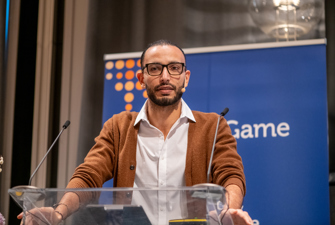Making mega-events more sustainable could just end in greenwashing
Sport’s role in lobbying key decision-makers to make the political changes that combat climate change can be more effective than trying to create more sustainable tournaments. That was the key take-away from a session at Play the Game 2024 on sport and climate responsibility.
“We cannot continue pretending that hosting mega events is sustainable,” said Sven Daniel Wolfe kicking off the session. Wolfe is an assistant professor at ETH in Zurich, and he argued that independent data is needed to assess the impact of events.
He added: “We have to be suspicious of hyperbolic phrases like the greenest games ever. Every event says it will be the most sustainable event ever and promising the moon, but data matters.”
Wolfe showed attendees a triple baseline model that assessed the economic, ecological and social impact of events, which can be used to provide an independent assessment rather than relying on “models propagated by the organisers themselves as there are conflicts of interests here,” as Wolfe said.
He added: “We need to question when mega-events break their promises, which they always do.”
Producing data is important
Åge Skinstad, chief executive of the 2025 World Ski Championship, said that the event due to be staged in Trondheim next year should aim to set a standard that subsequent events can build on. All attendees, including the media, will need to use a fleet of 150 electric shuttle buses that will be provided during the championships.
Subsequent assessment of how sustainable events are and producing data is essential, argued Rikke Rønholt Albertsen, a board member of the National Olympic Committee in Denmark.
“If you are going to get any public funding, you need to show that you are not doing more harm than good. But it’s got to be more than just ‘do we turn off the light or separate our waste’,” said Albertsen. “Stories that are anecdotes without data are not worthwhile.”
“A lot of sports are still like ‘what has this got to do with us?' So, we are still working to leverage our storytelling. We need to look at what the world needs us to do,” she said.
That storytelling can be undertaken by athletes, who have a far greater platform than any other cultural phenomenon, argued Espen Thorsby, chairman of the We Play Campaign in Norway, which is trying to get footballers to spread the message of more sustainable sport.
“Nothing comes close to football, which has twice as many followers as Christianity,” said Thirsby.
“I don’t think we will ever get Messi or Ronaldo [behind our campaign] but if we can get 10,000 footballers, then we can make a real change. Players can start off a chain reaction and move people. We believe that friendly nudging works to be positive and inspiring. There is a huge gap in information,” said Thirsby.
Sports' carbon emissions are insignificant compared to China's
As important as influencing personal behaviour and the organisation of more sustainable tournaments is, politicians should be the focus of that lobbying, argued Roger Pielke, professor at University of Colorado in Boulder, USA.
Sport’s role in climate change was put into context by Pielke with a provocative and thought-provoking presentation that showed that the 200,000 tonnes of carbon emissions generated from an entire English Premier League season was equal to just nine seconds of China’s total emissions in 2021.
Another startling example was that the total emissions from the six Summer and Winter Olympics between 2010 and 2018 were equal to those generated by a single Chinese city with a population of one million. And China has 114 cities with a population of more than one million.
“This doesn’t tell us that climate change is not important, it’s very important, but sport’s place is very small and attempts to combat this can result in greenwashing,” said Pielke.
“Sports organisations have an obligation to participate in addressing issues of global importance. At the same time, the risks of greenwashing are significant if the issue is poorly understood.”
Carbon offsets were dismissed as “gimmicks” by Pielke, who said that the focus for change to significantly reduce emissions “needs to be driven by government policy and advancing technology.”
So, while reducing sport’s carbon impact and independently measuring those emissions were important, the greatest impact that sport can have is in influencing politicians to make the changes that really matter in the fight against climate change.








